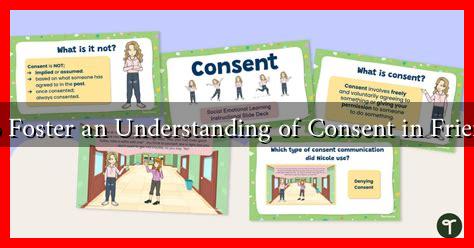-
Table of Contents
- How to Foster an Understanding of Consent in Friendships
- Understanding Consent: More Than Just a Buzzword
- Why Consent Matters in Friendships
- Practical Strategies to Foster Consent in Friendships
- 1. Initiate Open Conversations
- 2. Respect Boundaries
- 3. Practice Active Listening
- 4. Use “Check-Ins”
- Case Studies and Statistics
- Conclusion: The Path to Healthier Friendships
How to Foster an Understanding of Consent in Friendships
Consent is a fundamental aspect of all relationships, including friendships. It is essential for creating a safe and respectful environment where individuals feel valued and understood. However, the concept of consent is often overlooked in platonic relationships. This article explores how to foster an understanding of consent in friendships, providing practical strategies and insights to help individuals navigate this crucial aspect of their interactions.
Understanding Consent: More Than Just a Buzzword
Consent is commonly associated with romantic or sexual relationships, but it is equally important in friendships. At its core, consent means giving permission for something to happen. In friendships, this can relate to various aspects, including:
- Sharing personal information
- Physical touch, such as hugs or playful nudges
- Making plans or decisions that affect both parties
- Emotional support and boundaries
Recognizing that consent is a continuous process rather than a one-time agreement is crucial. It requires ongoing communication and respect for each other’s boundaries.
Why Consent Matters in Friendships
Understanding and practicing consent in friendships can lead to healthier, more fulfilling relationships. Here are some reasons why consent is vital:
- Builds Trust: When friends respect each other’s boundaries, it fosters a sense of safety and trust.
- Encourages Open Communication: Discussing consent promotes honest conversations about feelings and expectations.
- Prevents Misunderstandings: Clear consent helps avoid situations where one person feels uncomfortable or taken advantage of.
- Empowers Individuals: Understanding consent allows friends to express their needs and desires confidently.
Practical Strategies to Foster Consent in Friendships
Here are some actionable strategies to help foster an understanding of consent in your friendships:
1. Initiate Open Conversations
Start discussions about consent with your friends. You can approach the topic by sharing your thoughts on boundaries and asking about theirs. For example:
- “How do you feel about sharing personal stories?”
- “Are you comfortable with physical touch, like hugs?”
- “What are your thoughts on making plans together?”
These conversations can help establish a mutual understanding of each other’s comfort levels.
2. Respect Boundaries
Once boundaries are established, it is crucial to respect them. If a friend expresses discomfort with a particular topic or action, acknowledge their feelings and adjust your behavior accordingly. For instance, if a friend prefers not to discuss certain personal issues, honor that choice without pressuring them.
3. Practice Active Listening
Active listening involves fully concentrating on what your friend is saying, rather than just waiting for your turn to speak. This practice can help you better understand their feelings and boundaries. Techniques include:
- Reflecting back what you hear to confirm understanding.
- Asking clarifying questions.
- Validating their feelings, even if you don’t necessarily agree.
4. Use “Check-Ins”
Regularly check in with your friends about their comfort levels. This can be particularly useful in situations where boundaries may shift, such as during emotional discussions or physical activities. A simple question like, “Are you still comfortable with this?” can go a long way in reinforcing consent.
Case Studies and Statistics
Research shows that understanding consent can significantly impact the quality of friendships. A study published in the Journal of Social and Personal Relationships found that friendships characterized by mutual respect and open communication about boundaries were more likely to endure over time. Additionally, a survey conducted by the American Psychological Association revealed that 70% of respondents felt more secure in their friendships when boundaries were clearly communicated and respected.
Conclusion: The Path to Healthier Friendships
Fostering an understanding of consent in friendships is essential for creating healthy, respectful relationships. By initiating open conversations, respecting boundaries, practicing active listening, and conducting regular check-ins, individuals can cultivate an environment where everyone feels valued and understood. Remember, consent is not just a one-time agreement; it is an ongoing dialogue that strengthens the bonds of friendship. By prioritizing consent, we can build deeper, more meaningful connections with those we care about.
For more information on consent and healthy relationships, consider visiting resources like RAINN or Love Is Respect.

